- Arthur Conan Doyle
- Prostituutio Nivala
- How Does Speed Dating Work
- Ehkäisyrengas Nivala Prostituoituja Suomi
The day after an event you will tick the names of people you would like to see again. So on the night of the event you can concentrate on having fun, and nobody feels rejected. Join Today Say yes to new love Sign-up. How it Works Change your life in 5 minutes.
Arthur Conan Doyle
Create a profile Create your own unique profile online. Heavy machinery support for mining can be found in the Voorspoed area. Various other maintenance industries and services are well founded in Welkom which include engineering, and mechanical repairs. Welkom produces goods such as steel, lumber, dairy products, and beef. The high water table in the north-western part of the district makes it very suitable for maize production and should remain an important maize producing area.
The district is mostly covered by non-arable, moderate potential grazing land as well as marginal potential arable land. The region is also a major producer of sunflowers, poultry and beef cattle. Welkom's most notable sport feature is the multi-million Rand Phakisa Freeway situated between Welkom and Odendaalsrus, which opened in United States.
Harmony F. Welkom's airport is also used on a regular basis for hang gliding championships on a National and International basis. Welkom has a well established education system with some schools reaching their 60 years anniversary. Some prominent schools include:. Welkom is connected to Kroonstad and the N1 north via the R34, a dual carriageway.
Alternatively if driving south to Bloemfontein via the R30 through Brandfort. There is a goods rail link with Hennenman to the main Johannesburg — Bloemfontein line. Trains from there go to Johannesburg and Cape Town. Various hospices also exist. From Wikipedia, the free encyclopedia. Place in Free State, South Africa. List of primary schools. List of secondary schools. S — established in Dictionary of South African Place Names.
Lowry Publishers.
Retief J. Retrieved 28 August Vegetation of South Africa, Lesotho and Swaziland. Pretoria: DEAT. Niu, F. Rokosky, J. Pretorius, J. Retrieved 1 July Retrieved 21 November Boshof Dealesville Hertzogville. Bultfontein Hoopstad.
Prostituutio Nivala
Balkfontein Bothaville Wesselsbron. Categories : Populated places in the Matjhabeng Local Municipality Populated places established in establishments in South Africa. Namespaces Article Talk. Views Read Edit View history. Help Learn to edit Community portal Recent changes Upload file. Download as PDF Printable version. Wikimedia Commons Wikivoyage. Goldfields Mall. We wouldn't like restitution to result in conflict which might be bloody. The summit also recommended that the government introduce a land tax to discourage those who already own land from wanting to acquire more tracts of land.
A stay should also be imposed on ownership of land by foreigners, the summit recommended. The state was asked to regulate the use of land more stringently. The delegates agreed that the mushrooming of golf courses and game farms should be curbed, and the government should give priority to agriculture and housing.
It was recommended that there should be an audit of both public and private land, including land owned by churches. Addressing the media yesterday, Didiza said delegates at the conference had agreed that land reform had "been slow and costly". Didiza said it was also important for the country to look at the experiences of other countries such as Brazil, Namibia, Zimbabwe and Kenya which had told of their land reform experiences in the summit. They all pointed to the inability of markets to redistribute land to the poor without strong state intervention. Deputy President Phumzile Mlambo- Ngcuka said at the start of the summit on Wednesday that the willing buyer, willing seller principle was slowing down land reform.
She told delegates the principle would have to be revisited as the state was the only buyer, and farmers often asked exorbitant prices for their land. Most of the opposition political parties and bodies representing white farmers at the summit were against scrapping the willing buyer, willing seller principle. AgriSA, the voice of organised commercial agriculture, objected to the proposals. AgriSA director Hans van der Merwe said it was reasonable for land owners to expect a market-related price for land they had to part with, and this was best determined by the willing buyer, willing seller principle.
When the democratic government took over in , 87 percent of agricultural land was owned by whites. By the end of June the country's land restitution programme had settled of the claims made. On the redistribution programme, 3,1 million hectare of land had been delivered to rural and urban communities. Steytler was addressing Free State farmers during the farming body's annual conference in Bloemfontein.
He said farmers recognised the right that civil society had to debate the land-reform question, but the "glaring omissions" at the summit prompted more questions than furnished answers. Supported market-related policy. Introducing a discussion on successful land reform for a better economy in the Free State, Steytler said the impression was that farmers were to blame for the slow pace of land reform. Steytler said that land reform in the Free State had been hampered by the state not having enough money and a lack of skills in relevant departments. Farmers were adamant that the message to government must be that the principle of willing buyer, willing seller should stay.
It is well known that South Africa has the cheapest agricultural land in the world," said Kiewiet Ferreira, a farmer from Harrismith. Free State farmers also refuted earlier remarks that the state could not be the only major buyer of land in the market. Free State Agriculture spokesperson on land affairs Dirk van Rensburg said skills to make land reform work in South Africa lay in the hands of farmers.
One sign is the resolution at the end of last week's land summit rejecting the willing buyer, willing seller principle as the mechanism for land redistribution and restitution. Another is the sympathy expressed by Deputy President Phumzile Mlambo-Ngcuka and Land Affairs Minister Thoko Didiza for reappraisal of efficacy of the market as the empowering force of land reform.
The irritation of land-hungry black citizens is understandable. It is necessary to temper impatience with prudence, however. To change course precipitously might easily compound rather than solve the problem, particularly if it involves use of the expropriation clause in the Restitution of Land Rights Amendment Act of Though the expropriation power is meant primarily to expedite restitution rather than redistribution, a sub-clause in the law empowers the minister to expropriate land for land reform generally.
If expropriation is used repeatedly and extensively to speed up land redistribution, the consequences might well be disastrous. It might create the impression that South Africa is heading down the same road traversed by Zimbabwe's Robert Mugabe, with calamitous repercussions.
Abandonment of the willing buyer, willing seller principle might not even result in accelerated redistribution, as it is a matter of dispute rather than fact that the slow pace is caused by the market mechanism per se. There is evidence that suggests it might be due to the incapacity of the department of land affairs to proceed more quickly because of personnel and monetary shortages. From that a corollary follows: it might be more expeditious to expand the department's staff component and its land reform budget than to embark on an expropriation programme.
How Does Speed Dating Work
As with so many of the development problems facing the government, it would be wise to heed the counsel about proceeding with less haste to attain more speed. Government must come up with another mechanism that is not a simple thing," Agriculture and Land Affairs Minister Thoko Didiza's spokesman Steve Galane said. Deputy President Phumzile Mlambo-Ngcuka said at the start of the summit on Wednesday that the principle is to slow down land reform. She told delegates the principle will have to be revisited as the state is the only buyer and farmers often ask exorbitant prices for their land.
Didiza also raised concerns about the concept, saying the state should be allowed to influence how the markets work. Galane said delegates also recommended that a land tax be put in place and that the December 31, deadline for lodging restitution claims needs to be reviewed as some people have failed to meet it. Government will respond to these and will come up with a position," Galane said. As land redistribution is being hampered by foreigners buying land in South Africa, Galane said delegates have proposed a moratorium be imposed on the practice.
Since then 1,2 million people have benefited from land reform. By the end of June this year the country's land restitution programme had settled 62 of the 79 claims made. On the redistribution programme, 3,1 million ha of land have been delivered to rural and urban communities. South Africa's sugar industry says "willing buyer-willing seller" land reform -- under government review - is working in the sector but that claims on land taken under racist laws slows the process.
Most South African commercial farmland remains under white ownership and ministers have repeatedly said a "willing buyer, willing seller" approach is at the centre of their bid to have 30 percent under black ownership by Landless groups say the process is too slow and the government last month said it would review it, although it did not say what it might be replaced with. In the local farmers association I belong to, there are now more black farmers than white.
Ehkäisyrengas Nivala Prostituoituja Suomi
Across the country, the Landless Peoples' Movement says only three percent of farmland has been redistributed in more than a decade of democracy -- although officials say the figure may be higher. In the sugar sector, 10 percent of land is already in black, mixed race and Indian hands, probably the highest in any part of agriculture. As well as buying land from willing sellers, South Africa has been forcibly purchasing farms taken from local people under colonial or apartheid laws after Stewart says this process has actually slowed the process of redistribution. You can't sell the land and so I think that the land claims process, certainly in the sugar industry, is an impediment to redistribution.
Some critics - mainly white - warn that handing land to new black farmers who lack the skills or money to farm risks collapse and shortages similar to neighbour Zimbabwe. But while there have been a series of high profile failures on farms handed to black owners, the sugar industry in particular has made much of several high profile successes in which emerging black growers have seen farms grow dramatically. He took over a former SASA research farm five years ago and since then has bought it with a commercial bank loan and almost quadrupled the area under cane.
The industry - which has started a company called Inkezo to facilitate land transfer to emerging farmers - helped connect him to a neighbouring white sugar farmer who became his mentor.

Gumede now has the best quality sugar cane in the area. Inkezo said it had no great shortage of white farmers keen to sell their land, particularly individuals in their fifties and sixties who were keen to help mentor a black farmer before retiring. But the fact some farms were under claim slowed this, they said.
SASA's Stewart said there were no good figures for how many black farmers were succeeding, but that he believed the industry was on track to meet the 30 percent target by But others have reported good profits to the extent that they are now buying second farms.
